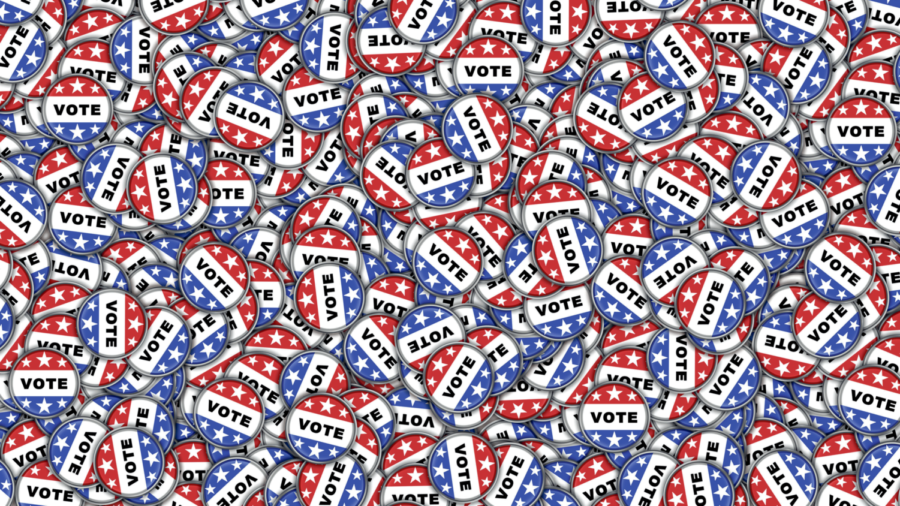The abridged version of this article appeared in the Nov. 2022 print edition of The Mirror. This is an uncut version.
Ah, yes. Voting. A cornerstone of American freedom.
The framers of the Constitution vigorously debated voting rights, the extent of the population they should be granted to and the power they should hold. More than a century after that, African-Americans and women both tirelessly fought for the right to vote, with words and ink and protests, and won it. And yet, the rights these numerous demographics toiled and hustled to gain access to are disregarded by many, dismissed with a metaphorical wave of the hand. Especially by 18-year-olds.
Not to harp on the maturing greenhorns of Gen Z — everyone between the ages of 8 and 23 —but they could do better at maintaining responsibility in their life, getting off of TikTok and Instagram and actually getting around to pausing that online game. Okay, maybe that last point isn’t possible yet, but nevertheless, they still have a long way to go before reaching true adulthood.
Naturally, of course, once they turn 18, voting rights get shoved onto them, thanks to young Vietnam War soldiers who proclaimed they were old enough to fight but not old enough to vote. And yet, what do they, the Gen Z 18-year-olds? They don’t vote. According to the US Census Bureau, individuals between the ages of 18 and 29 have the lowest voter turnout by age group.
Now, don’t blame the average Gen Z 18-year-old. After all, they’re focused on attending college, working, managing responsibilities and planning how to delay moving out of their parents’ house. They’re probably busy catching up with their friend’s latest Instagram story.
The average 18-year-old just leaves voting rights scattered around on the floor, a dead tool in an even more dead toolbox. A toolbox that bristles with opportunities, yet is left laying in the dustiest corner of the teenager’s toolshed.
But the complaints about the voting-age are somewhat misplaced. They’ve developed some alternative methods of voicing their political points of view that are pretty creative.
For example, scrolling through TikTok to find a topic or issue that upsets them and proceeding to leave a sarcastic and passive aggressive comment. Or maybe checking out the news every once in a blue moon, and then ranting to their friends about what they perceive to be the various problems ever-present in society.
And yet, what good is that going to do? We all have opinions that need to be heard by a trusted friend every now and then, but who else is listening besides that friend at that moment? If a person were to stand in public on the sidewalk of the busiest street and chant the same message over and over for a mind-numbing number of hours, how many people would listen?
Who is really listening to other perspectives when they’re sending around hashtags or posting social media stories? And even if a person were to find a way to get enough people to listen to them, how would they ensure that their points of view would be considered and potentially implemented in the realm of political affairs?
The only true way to make a politician listen is to vote. Get up off your couch, go to your nearest polling place and vote. Place that completed ballot, that sacred slip of paper symbolizing your God-given right to representation into the ballot box (or mailbox, if you so prefer) and breathe a sigh of relief knowing that your opinion is going to be heard.
But wait, there’s more! What if that average 18-year-old has some sort of excuse for not voting? What if, say, they’re neutral in regards to the subject or politician at hand, and thus, they’d rather not go vote in the first place?
First, anyone in their right mind should probably check if the teen is lying (and they do lie, especially if the lie keeps them from leaving the sanctuary of their comfortable couch). Being neutral is such an overused expression that it’s become hard to tell if the person is actually neutral or if they would rather just skip voting in the first place. Or, potentially, if they would rather vote for someone that isn’t popular among voters.
Second, even if this theoretical teenager is neutral, there’s still no reason to hang back from the ballot box. Although they may be truly ambivalent about all of the political candidates running for office, that doesn’t necessarily mean that they equally agree or disagree with all of the political parties these candidates represent.
Surely, there must be a political issue that this neutral individual has an opinion on, as Gen Z has proven to be quite vocal with their opinions. And if they feel a certain way, why, other than for the simple convenience that’s derived from inactivity, would they hold back from voting?
This leads to an even more baffling question. If Gen Z is truly becoming more focused on social issues and rights then why are 18-year-olds hanging back? Are they really so lazy that they would choose to remain idle in the face of a potentially dire future where Donald Trump is dictator for life?
The answer is probably yes. While the thought of personal and political rights doesn’t necessarily have to invoke a patriotic swelling of a Gen Z heart every time they mindlessly scroll through social media, there is certainly a lack of appreciation for voting rights.
It’s really not surprising, and in fact it is depressing, that young people ages 18 to 29 have the lowest voter turnout across the nation. The most troubling, pessimistic fact about Gen Z is that they take not just voting rights but the world for granted. Individuals belonging to this generation believe that the world owes them a society they desire, and upon realizing that the realities of their life don’t conform to the envisioned standards and expectations of their idealized utopia, they proceed to sit in their own little corner and complain.
Unfortunately, they don’t recognize how their time and energy can be better directed and more efficiently spent if they approach contentions head-on from the beginning. What’s the point of struggling to maintain abortion rights for women if 18-year-olds just want to keep their voice to themselves when they have the opportunity to make a real difference? What’s the point of expanding LGTBQ+ rights if the younger generation won’t exert and protect the rights they currently retain? What’s the point of keeping Trump and his supporters at bay if the generation which claims to represent the spirit of a revolutionizing nation actively refuses to officially represent its own political values?
Then again, who knows? Maybe Gen Z will surprise us. Maybe they will enter that old toolshed one day and take a look around. Maybe they will, one day, discover that deserted toolbox sitting in a dusty corner. Maybe they will dust off the toolbox and take a look inside. And hopefully, if and when they do that, they will use their voting rights, and use them well. For if they truly believe that the issues they care about are crumbling away, this tool may be the only one that can repair what’s broken in our society.




